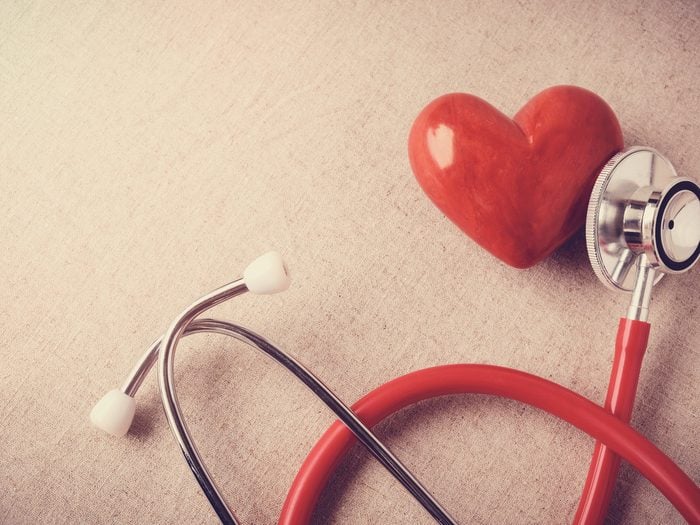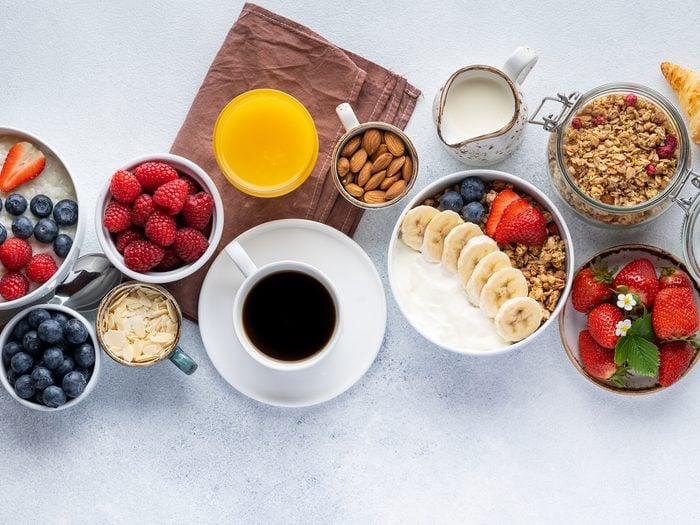
Is skipping breakfast bad?
We’ve all heard the old adage that breakfast is the most important meal of the day. Yet a whopping 34 per cent of Canadians reported skipping it at least once during the workweek according to an Ipsos poll, saying they simply weren’t hungry or didn’t have time for breakfast.
Harvey Anderson, a professor in the departments of nutritional sciences and physiology at the University of Toronto, says that everybody has different nutritional needs for their first meal of the day—making it hard to be prescriptive about what to eat. Your needs might depend on your age group, or whether you work in an office or, say, a construction site.
“But the bottom line,” Anderson adds, “is that people should eat something before they go to work, no matter what time of day it is.” That’s because when you wake up—whether that’s in the morning, afternoon, or evening—your body is essentially breaking a fast. That means it’s looking for fuel to tackle what’s next.
One of the most important things we can do for our body, Anderson says, is to maintain a consistent meal frequency throughout the day—and this healthy lifestyle includes breakfast. But what actually happens to your body if you’re part of the 34 per cent that decided to skip the first meal of the day?

It can sap your smarts
Is skipping breakfast bad for your grey matter? In short, yes—although it affects the brain in a number of different ways.
A Pennsylvania School of Nurses study found that children who didn’t eat breakfast regularly had lower IQs than those who did. The study’s authors also suggest that the social interaction that occurs when children eat breakfast with their families can help with cognitive development.
Those brain-boosting benefits aren’t just for the small set, either: Breakfast has been shown to improve alertness and cognition in adults, too. Some studies have shown that eating breakfast can positively impact your memory if you’re already a healthy adult. If you skip breakfast, you might have trouble with delayed recall, or the ability to remember something that you learned earlier in the day.
Discover 20 daily habits to boost your brain power.

You may have less energy
Our bodies get energy from glucose, which we obtain mostly from carbohydrates. Even when you’re sleeping and not consuming any food, your body needs energy to function and will use the glucose it stored throughout the day. When you wake up, your body needs to replenish these glucose stores (and thereby your energy). That means people who skip breakfast to reduce their calorie intake are often being counterproductive. Not eating the meal could make them sluggish and studies show that breakfast gives us more energy to be physically active in the morning, which helps burn calories.
Here’s what happens to your body when you start walking 10,000 steps a day.

Your cholesterol may increase
People who skip breakfast may eat more throughout the rest of the day to make up for that feeling of hunger. What’s worse, some of the late-night snacks they’ll end up craving tend to be more fatty or sugary than they’d normally eat throughout the day, increasing their cholesterol levels. Cholesterol causes fat to build up in arteries and, in the worst cases, increases the risk of heart attack and stroke.
Find out which foods nutritionists never eat late at night.

You’re more likely to suffer from stress and depression
A study published in the International Journal of Environmental Research and Public Health found that teens who started their day with a nutritious breakfast reported lower levels of stress and depression, and ultimately, higher quality of life. The irony? Teens are among the most likely to skip breakfast altogether.
Find out how to read nutrition labels like a pro.

Not all breakfasts are made equal
Eating breakfast can help set you up for success—if it’s nutritious and suited for your lifestyle. According to experts, a healthy breakfast should include fruits or vegetables, whole grains, healthy fat (think avocado) and protein. “The worst is probably just waiting and grabbing a donut, which is basically just fat and carbohydrate, along with your coffee on the way to work,” Anderson says.
Next, feed your brain with this MIND Diet meal plan.